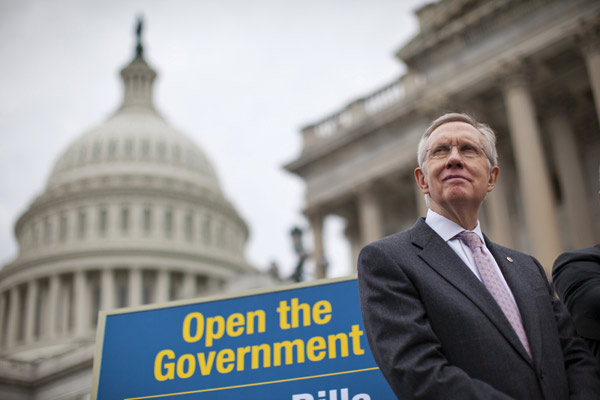Shutdown used for 2014 campaign fire
US citizens pin the blame for the current budget impasse on their lawmakers, but that's not stopping Democrats or Republicans from exploiting the crisis of their making for political advantage ahead of 2014 elections.
As the federal government shutdown enters its 10th day with no solution in sight, they are using the nightmare-turned-reality to press their political case - and pad their coffers.
With a full 13 months before voters troop to the polls, political groups are unveiling TV and radio attack ads in swing states and districts.
Senator Mark Begich, a vulnerable Democrat in Alaska who is up for re-election, used a radio ad to blast "a small band of knuckleheads" for "holding the country hostage over the healthcare law".
Other ads targeted specific lawmakers, such as Republican congressman Tom Latham of Iowa.
"Tom Latham joined with Tea Party Republicans in Congress and shut down our government, putting hundreds of thousands of Americans out of work, slashing Head Start for thousands of kids, putting benefits for seniors at risk, denying cancer treatment for kids, and halting food inspections," said a 30-second TV spot.
The ad is one of 10 created recently by Americans United for Change to highlight Republican lawmakers aligning with their party's conservative faction whom many blame for the shutdown.
The group insists the showdown could translate into Democrats seizing the 17 seats necessary to take control of the House of Representatives next year.
"There were enough seats in play even before the government shutdown - due to their inaction on critical issues like immigration reform, gun violence and jobs," said Brad Woodhouse, president of the liberal advocacy group.
"The seats that were already in play are even more up for grabs."
House of Representatives Republicans meanwhile are considering signing on to a short-term increase in the government's borrowing authority to buy time for negotiations on broader policy measures, according to a Republican leadership aide.
How long the increase might suffice - a few weeks or a few months - was unclear. But agreement by Republicans and Democrats to raise the debt ceiling would at least stave off a possible default after Oct 17, when Treasury Secretary Jack Lew has determined the government will no longer be able to borrow.
US President Barack Obama has said he would accept a debt ceiling increase of limited duration as long as no strings were attached, except perhaps a non-binding agreement to discuss policy issues.
It was unclear on Wednesday night how far Republicans might be prepared to go to meet Obama's conditions. Republicans in the House have been demanding a variety of conditions - including changes to Obama's healthcare law - in return for cooperating on the debt ceiling and on a funding measure that might reopen the government.
In recent days, however, Republican emphasis has shifted more toward deficit reduction measures and less to Obamacare, the healthcare law.
Republicans in particular and Congress in general have taken a public beating in the showdown, with an Associated Press-Gfk survey on Wednesday showing Congress as a whole at a rock-bottom 5 percent approval rating. More than six of every 10 US citizens blamed Republicans for the impasse.
AFP-Reuters
|
 Senate majority leader Harry Reid stands on the Senate steps on Capitol Hill in Washington on Wednesday, during a news conference on the ongoing battle over the federal debt limit and the government shutdown. Evan Vucci / Associated Press |


















